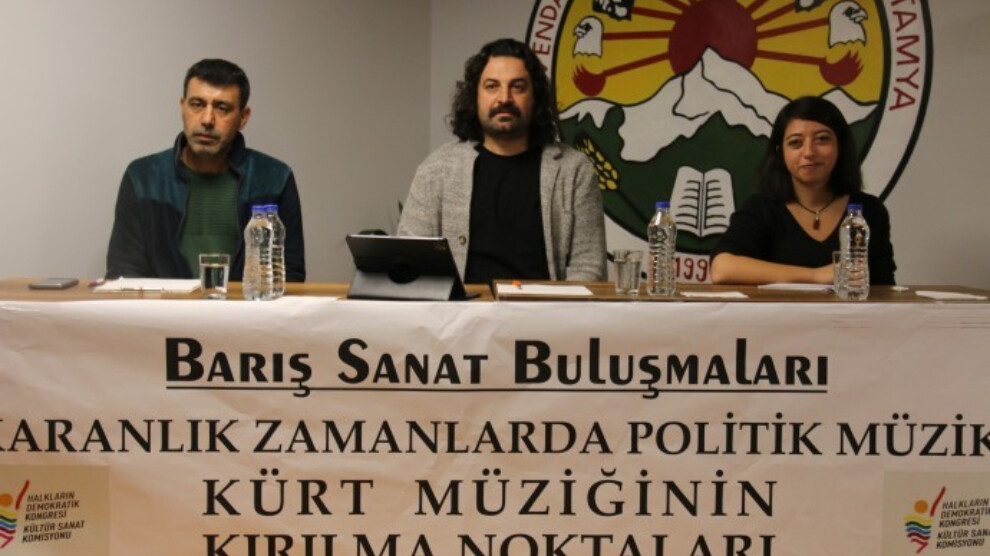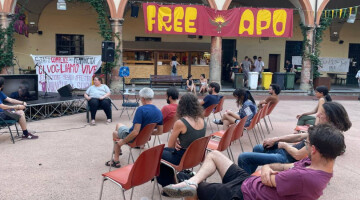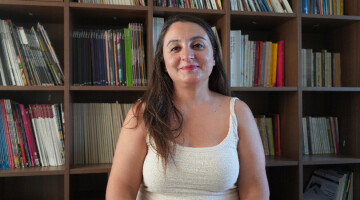The Peoples' Democratic Congress (HDK) Culture and Art Commission organized a panel within the scope of the "Peace and Art Meetings". Musician Sinan Gökçe moderated the panel that was held at the Mesopotamia Cultural Center (MKM) with the title "Political music in dark times and the breaking points in Kurdish music". Sociologist Nazlı Buket Yazıcı and Musician Arif Adalı were among the speakers at the panel.
Sinan Gökçe underlined that artists who have made political music from history to the present have paid a great price, and reminded that many were forced to spend their lives in exile. He cited poets and artists such as Pir Sultan Abdal and Ahmet Kaya as examples. "The common fate of all of them is to pay a price," Gökçe said, adding: "Political artists had to pay a great price to power in every period, but they never gave up on production."
Gökçe named Ahmet Kaya, Victor Jara and Zülfü Livaneli, who produced political music and were oppressed by dictatorial governments. He said that they continued to produce and maintain their cultural resistance even under fascist conditions. Pointing out the effect of Şivan Perwer's song "Kîne em" on Kurds in the 90s on Kurdish music in Turkey, Gökçe said: " While an existing freedom struggle was going on, this song gained an identity. Even though everything was stagnant in a process where the pressure was at the highest level, the musical processes were always active."
Sociologist Nazlı Buket Yazıcı, referring to the title "Political music in dark times", noted that the rulers sometimes use political music as a propaganda tool. Yazıcı continued: “Rulers often use political music as a means of pressure on the people, while at the same time trying to reach the people by making their own propaganda. But revolutionary political music is very different from that. It tells about the oppression, exile and revolts experienced by society in different periods of history. While revolutionary music can express pain and sadness, it can also organize a rebellion by instilling hope in society. For the oppressed, generally, political music is a propaganda tool and they cling to music to hold on to life. During the period of repression, the state exiled all opposition artists by force. Because their organizations were dissolved, but they had a political background. There was a sense of despair after the coup. But the 90s instilled a little more hope into the masses. For example, Ahmet Kaya's song "Baş Kaldırıyorum" ("I Rebel") brought a confrontation about what happened on 12 September [1980 military coup] and organized an important resistance. He took a stand against the pressures on Kurdish music and said that he wanted to make music in Kurdish. He was exiled after this declaration and actually caused a break in Kurdish music in Turkey. Because Kurdish music is still banned and under pressure. But making an album in Kurdish means keeping the music and culture of a people alive. It is to reflect the pain of society in those dark times with music and to lead the people. That's why music actually reflects the spirit of its age and sheds light on it."
Artist Arif Adalı, on the other hand, said that Kurdish music is exposed to a lot of external pressure and said that it is still insufficient to define itself politically. Pointing out that Kurdish music should be based on an ideological, free women's, communal and ecological paradigm as well as its content, Adalı said that “otherwise, this causes a sterilization of Kurdish music. It leads to corruption and decay. Kurdish music has lost its revolutionary character. The reason is the disconnection between ideological discourse and art. It is important how the political Kurdish artist defines himself accordingly.”















